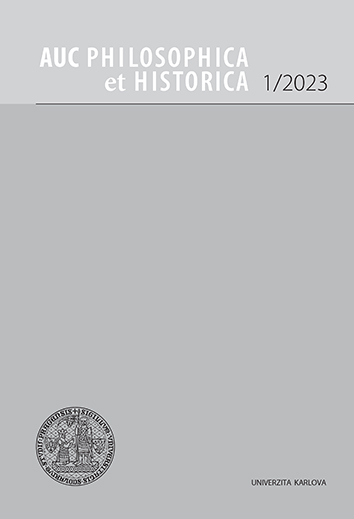AUC Philosophica et Historica (Acta Universitatis Carolinae Philosophica et Historica) is a multidisciplinary academic journal focused on the humanities with more than 50 years of tradition.
The journal is indexed in CEEOL, DOAJ, and EBSCO.
AUC PHILOSOPHICA ET HISTORICA, Vol 2020 No 2 (2020), 255–261
On Writing Fluid Histories of Modern Art with Jacques Rancière
Karolina Rybačiauskaitė
DOI: https://doi.org/10.14712/24647055.2021.11
published online: 02. 08. 2021
abstract
In this paper it is claimed that the conception of art regimes by Jacques Rancière may be a productive tool for coming across various binary oppositions used while thinking about modern art, such as modernism/social realism, official/non-official, political/apolitical, and let us write more fluid histories of modern art in the post-socialist and post-soviet countries.
keywords: Clement Greenberg; binary oppositions; fluid histories; modern art; art regimes; Jacques Rancière; post-socialist
references (12)
1. Eda Čufer, Enjoy me, Abuse me, I Am Your Artist: Cultural Politics, Their Monuments, Their Ruins, in: N. Kotsopoulos (ed.), Contemporary Art in Eastern Europe, London 2010.
2. Clement Greenberg, Modernist Painting, first published in: Forum Lecture, Washington, DC, 1960, then reprinted in: Art & Literature, Lugano, No. 4, Spring 1965, pp. 193-201.
3. Clement Greenberg, Avant-garde and Kitsch, in: Art and Culture: Critical Essays, Boston 1965, pp. 3-21.
4. Ben Highmore, Ordinary Lives. Studies in the Everyday, Oxon & New York 2011. CrossRef
5. Ana Peraica, A Corruption of 'Grand Narrative' of Art, in: IRWIN (eds), East Art Map: Contemporary Art and Eastern Europe, London 2006.
6. Jacques Rancière, Le Partage du Sensible: Esthétique et Politique, Paris 2000. CrossRef
7. Jacques Rancière, The Future of Image, trans. by Gregory Elliot, Brooklyn and London 2007.
8. Jacques Rancière, Modern Times: Essays on Temporality in Art and Politics, Zagreb 2017.
9. Jacques Rancière, Understanding Modernism, Reconfiguring Disciplinarity: Interview with Jacques Rancière (May 11, 2015), in: Patrick M. Bray (ed.) Understanding Rancière, Understanding Modernism, London-New York, 2017, pp. 263-289.
10. Gabriel Rockhill, Interventions in Contemporary Thought: History, Politics, Aesthetics, Edinburgh 2017. CrossRef
11. Karolina Rybačiauskaitė, Rancière's Challenge for the Lithuanian Modern Art Histories: The Possibility of New Sensible Structures, in: Problemos, vol. 97, 2020, pp. 198-208. CrossRef
12. Joseph J. Tanke, What Is the Aesthetic Regime? In: Parrhesia, No. 12, 2011, pp. 71-81.

On Writing Fluid Histories of Modern Art with Jacques Rancière is licensed under a Creative Commons Attribution 4.0 International License.
